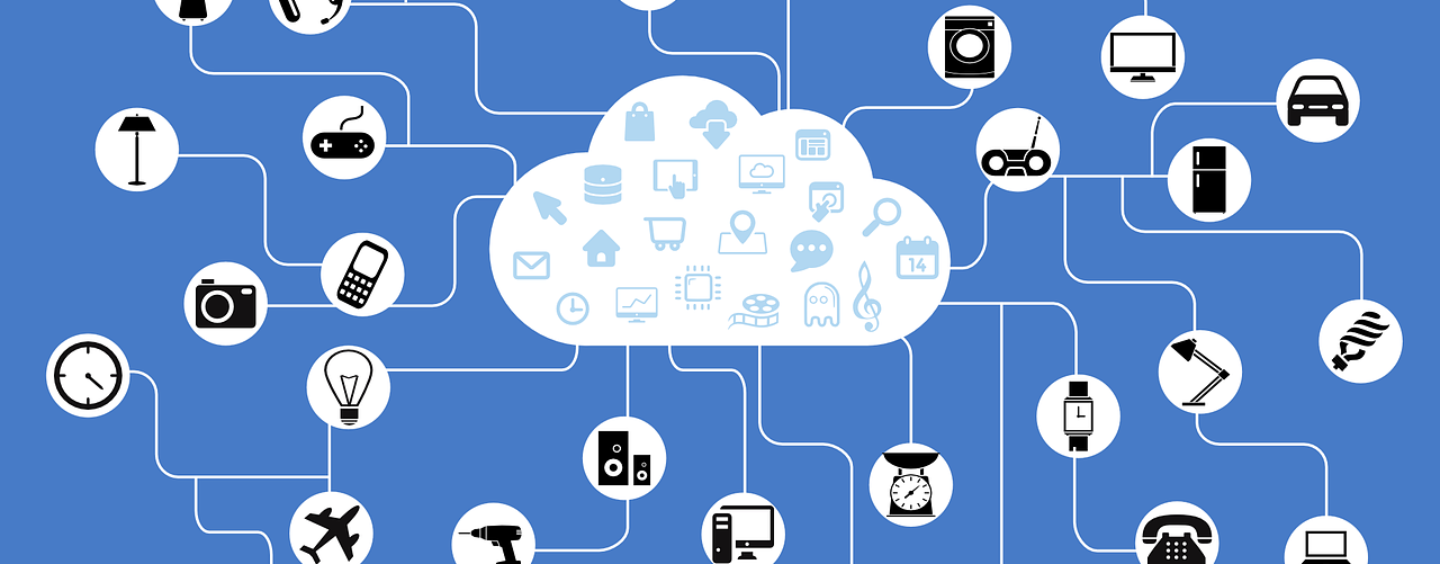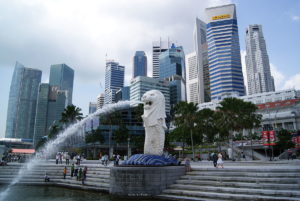
Internet-of-Things Technologies to Play a Key Role in Singapore’s Smart Nation Push
by Fintech News Singapore August 2, 2017In Singapore, Internet-of-Things (IoT) technologies are set to play a key role in the city-state’s digitalization push and Smart Nation plan.
IoT refers to a network of Internet-connected physical objects, vehicles, buildings and other items embedded with sensors, electronics, and software. These objects are able to collect data without requiring human-to-human or human-to-computer interaction.
Examples of objects that can fall into the scope of IoT include connected security systems, thermostats, cars, electronic appliances, vending machines and more.
Businesses and individuals can leverage IoT applications to automate tasks, such as notify authorities when a fire extinguisher in a building is blocked, or automatically adjust a room’s AC.
IoT: smart city, smart nation applications

Image credit: the Merlion statue in Merlion Park, Singapore, via Wikipedia
Smart city is another powerful application of the IoT that’s been generating great curiosity. Smart surveillance, automated transportation, smarter energy management systems, water distribution, urban security and environmental monitoring all are examples of IoT applications for smart cities.
According to Prof. Toh Chain Keong, assistant chief executive officer of Infocomm Development Authority (IDA), sensing capabilities enabled by IoT will drive the development of Smart Nation applications.
“Without sensing capabilities, we cannot build context and intelligence, we cannot build Smart Nation applications and from there develop the smart services that we envisage,” he said.
IDA has been working with industry and public sector partners to develop a Smart Nation Platform (SNP), which is set to comprise a connectivity layer and a sensing and IoT layer. SNP will provide the infrastructure for integrating inputs from an island-wide network of IoT devices. It aims to help government agencies provide better services for citizens in areas such as emerging response, urban planning and city management.
“We believe that with sensors and IoT, the environment will become more and more intelligent and interactive,” said Prof. Toh. “With smart sensing and smart meters, we will be able to generate useful data, drive analytics and develop applications in smart health, smart transport and smart living.”
Lee Chew Chiat, Deloitte Southeast Asia’s public sector industry leader, expects to see smart machines enter offices, factories and homes “in numbers we have never seen before” in the next decade.
“They will become integral to teaching, medicine, production, security, and virtually every domain of our lives,” he told the Business Times.
“The adoption of IoT technologies will be a key component for smart nation services,” he said. These will enable the exploitation of technologies to address challenges such as the increased strain on healthcare facilities and resources, traffic planning and congestion prevention, with the aim of “enhancing residents’ quality of life.”
In the area of healthcare monitoring, wireless sensing technology embedded in the walls of buildings or any fittings, can monitor breathing, heart rate and other vital signs in real time.
An elderly person with critical diabetes condition can be diagnosed for increased levels of blood sugar by a wearable device on his or her wrist, and the nearby healthcare provider would be notified of the condition.
IoT innovation from Singapore
Siemens, Europe’s largest industrial manufacturing firm, recently launched a digitalization hub in Singapore where the firm will collaborate with customers, partners and universities to develop and offer new digital applications.

Siemens MindSphere infographic, via Siemens
Siemens has also signed a partnership with Singapore to become the first country in the world to pilot MindSphere, Siemens’ open, cloud-based operating system for the IoT.
Dr. Beh Swan Gin, the chairman of the Singapore Economic Development Board, said:
“We are proud to partner Siemens in its new Digitalization Hub which will support Singapore’s move to become a Smart Nation. Leveraging Siemens’ MindSphere operating system, this Hub will create new opportunities for businesses to tap into the country’s rich digital ecosystem to co-develop innovative digital solutions in the Industrial IoT space.”
Starting with 60 specialists, the hub team is expected to grow to 300 by the end of 2022.
Last year, hardware vendor Dell opened a lab in Singapore to tap into the growth of IoT in Asia-Pacific (APAC). The Dell IoT lab was launched in collaboration with Intel and aims to provide a platform for customers in APAC, including Japan, to test proof-of-concept (POCs) IoT products.
Bosch, the German engineering and electronics firm, has been experimenting with IoT internally in its premises in Singapore.
A research team at the firm has been using IoT sensors in the canteen at Bosch Singapore to control temperatures and save on power-hungry air conditioning. The system allows workers to have the air conditioning set to individual tastes.
Besides the large corporations, Singapore also hosts a number of innovative IoT startups.
De-Wired, for instance, designs customized IoT platforms and packages for companies’ needs. Unified Inbox specializes in intelligent IoT messaging and develops technologies for smart homes, smart cities, and smart enterprises. Xped has developed a revolutionary technological platform that allows anyone using their smartphone to connect and control all of their electronic devices found in their everyday environment.
Featured image: Internet-of-Things concept illustration, via Pixabay.







